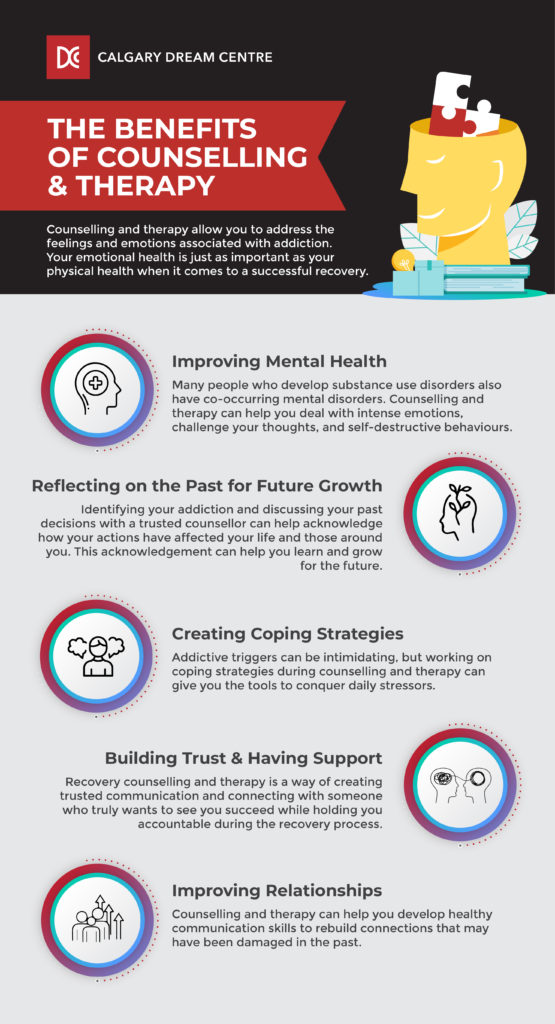If addiction has felt mentally draining, you’re not alone.
Addiction is more than a physical dependence on a substance—it’s emotional and psychological too. It’s something complex that doesn’t have a one-size-fits-all solution.
Managing addiction is an ongoing process, and you should be proud of how far you’ve come. Since it’s an ongoing journey, therapy and counselling can provide you with strategies, so you’re prepared for the road ahead. With individual and group programs available, support is within reach.
Counselling and therapy can give you the tools to succeed, so life after treatment can be lived to the fullest.

Benefits of Counselling & Therapy
Improving Mental Health
Addiction and mental health have a strong connection. Many people who have substance use disorders are also diagnosed with co-occurring mental disorders, including:
Much like physical recovery is an important step in any type of addiction, mental and emotional healing are essential too. Behavioural therapies and community-based mental health care help you deal with intense emotions, challenge your thoughts, and limit self-destructive behaviours.
Reflecting on the Past to Allow for Future Growth
Addiction can change the way you think. Counselling and therapy can help you make peace with decisions made in the past and offer a fresh perspective to identify the habits, behaviours, and thoughts that have contributed to addiction.
With strategies such as the 12-step program, you’re allowed to be honest with yourself, and reflect on the past to make positive changes for continual growth.
Your emotions throughout the process are valid, and spending time having a conversation with a professional or trusted support person can help you work through and manage these feelings. Addiction therapy can be an instrumental way to overcome guilt and give you a positive outlook for the future.
Providing You With Coping Strategies
Breaking the cycle of addiction is no easy feat, and your strength should be acknowledged. After putting in the work to better yourself and your life, it may be intimidating to go out into the world with possible addictive triggers.
Mental and social factors that can trigger relapse include:
- Daily stress
- Environmental cues
- Spending time in social groups where a substance is present
It’s okay to feel nervous because it means you care about your recovery and your success. Counselling and therapy can help alleviate the stress associated with day-to-day triggers and provide you with coping strategies unique to your situation.
Like any muscle in the body, challenging the brain to think in new ways takes time and practice. Recovery programs can help give you the tools and unwavering support needed for successful recovery.
Building Trust & Having Support
Addiction can create negative feelings of believing you have no one to turn to. Though it may not seem like it at the time, there are plenty of people who want to help and see you succeed.
Addiction recovery may be a deeply personal experience, but having a trusted support network can help encourage recovery by having someone to lean on during the challenging times.
Recovery counselling and therapy is a way of creating trusted communication and connecting with someone who truly wants to see you flourish. Having someone in your corner can help keep you accountable for your recovery journey.
Improving Relationships With Loved Ones
Addiction is undoubtedly challenging for the addict, but it affects families and loved ones as well.
Family support can play a positive role in addiction recovery, knowing your loved ones are there for you each step of the way. Counselling and therapy can help you develop healthy communication skills to rebuild connections that may have been damaged in the past.
By freeing your mind from negative thoughts and addressing past behaviours with the help of a recovery program, you can improve relationships with your loved ones.

Taking Care of Your Mind, Body, & Spirit
Identifying that you need help and reaching out for support is a courageous act. At the Calgary Dream Centre, we want to help support you in the growth and health of your mind, body, and spirit.If you or someone you know is struggling with addiction, please contact us. The road to recovery starts today.



